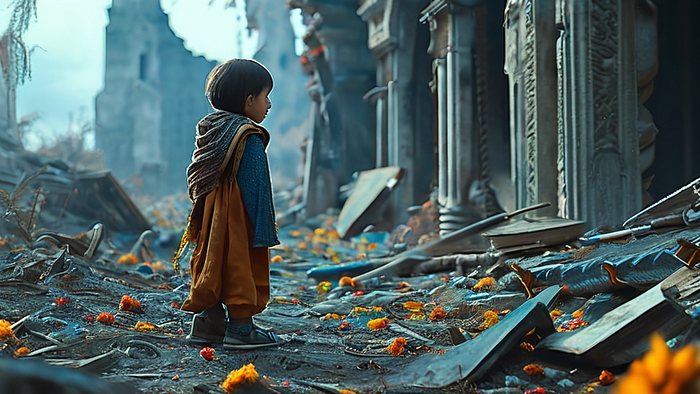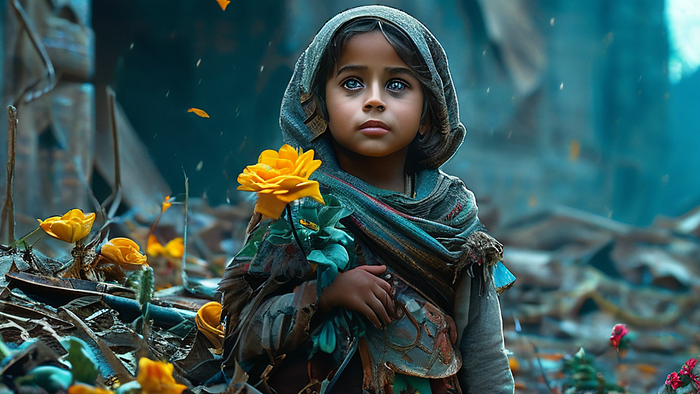No products in the cart.
Scars of War, Echoes of Resilience: A Journey Through Iraq’s Enduring Hardship
War-torn but unbroken. Discover the human cost of conflict in Iraq, the psychological toll, and the resilience that fuels hope for a better tomorrow.

I was sitting here watching the Olympics… and the game that was on was Iraq versus Argentina and I just started thinking about the players on the Iraqi team…
And by the way… knowing how folks these days love to be outraged — this isn’t a political statement — I am a very proud American citizen and US Army veteran… this is not a reflection on the people in the military, the government’s policies, my own service, etc. I could make arguments on both sides of the US/Iraq political debate and I have an informed nuanced POV and opinion on the topic… but this article today isn’t about that.
This story is just a commentary on how brutal it must have been for the Iraqi people and how so many in that nation are affected by the actions of others. It’s about how lives were changed… with many of them being innocent and were simply born into a jacked-up situation that they didn’t ask to be brought into. I wonder about my own kids… what would have become of them… if they made it out of a situation like that? Your mind can take you in many directions if you let it.
I was thinking about how those soccer players (like so many in the country of Iraq)… must have seen horrific things. All of them probably know of people who have gotten killed at the hands of someone else — be it from an Iranian, an Iranian proxy, a US (or US ally) soldier, a foreign fighter, a fellow but opposing citizen, a member of ISIS, a corrupt official, etc. Most everyone on that soccer team is under 35 years of age… which means all of them have seen nothing but the brutality of war… for their entire life.
I just was thinking about how there are 2+ generations of people who know nothing but death, turmoil, chaos, anarchy, violence and the tearing up of their country. So I decided to do some diving into the situation and this is the resulting thoughts that came out of that:
In the heart of the Middle East, a nation bears the weight of decades of relentless conflict. Iraq, a land steeped in ancient history and cultural richness, has become synonymous with war, violence, and unimaginable suffering. For over four decades, the Iraqi people have endured a seemingly endless cycle of turmoil, leaving deep scars on their collective psyche and shaping the lives of generations.
The story of Iraq’s modern struggle begins with the rise of Saddam Hussein, a dictator whose reign of terror lasted from 1979 to 2003. Hussein’s regime was marked by brutal repression, widespread human rights abuses, and a disregard for the lives of his own people. His paranoia and quest for absolute power led to the persecution of minority groups, including the Kurds, who were subjected to chemical weapons attacks in the late 1980s. The Halabja massacre of 1988, in which an estimated 5,000 Kurds were killed by chemical agents, stands as a chilling reminder of the regime’s cruelty.
In 1980, Hussein launched a devastating war against neighboring Iran, a conflict that dragged on for eight long years. The Iran-Iraq War, fueled by territorial disputes and ideological differences, exacted a heavy toll on both nations. Millions of lives were devastated, with many hundreds of thousands (perhaps up to 2 million) lost forever, and countless families were torn apart. For Iraqis, the war brought economic hardship, food shortages, and the constant threat of violence.
One survivor of the Iran-Iraq War, Ahmed, recalls the horrors of those years: “We lived in constant fear. The bombs could fall at any moment. We lost friends, neighbors, family members. It was a time of great sorrow.” Ahmed’s story is just one of many, a testament to the collective trauma endured by the Iraqi people.
The end of the Iran-Iraq War brought little respite. In 1990, Hussein invaded Kuwait, triggering the Gulf War. A U.S.-led coalition swiftly defeated Iraqi forces, but the conflict left Iraq’s infrastructure in ruins and its economy crippled by international sanctions. The sanctions, intended to pressure Hussein’s regime, had a horrible and long-lasting impact on ordinary Iraqis. Malnutrition, disease, and poverty became widespread, particularly among children.
20+ years of the Global War on Terror, initiated by the events of 9/11, marked by evil actions of foreign terrorists, Iraq insurgency, sectarian violence and others… claimed countless lives and displaced millions of people. The 2003 invasion of Iraq, led by the United States, toppled Hussein’s regime but plunged the country into further chaos.
Fatima, a resident of Baghdad, remembers the years following the invasion as a time of constant fear and uncertainty: “We didn’t know who to trust. There were bombs, shootings, kidnappings. We were always afraid to leave our homes.”
The rise of ISIS in 2014 marked another dark chapter in Iraq’s turbulent history. The extremist group, known for its brutality and intolerance, seized control of large parts of the country, imposing its harsh interpretation of Islamic law. ISIS carried out mass executions, destroyed cultural heritage sites, and persecuted religious minorities.
The Iraqi people, with the support of international forces and lead by the United States of America and the expert capabilities of the U.S. Special Operations units, ultimately defeated ISIS in 2017. However, the scars of the group’s reign of terror remain. Thousands of Iraqis are still missing, and many communities are struggling to rebuild their lives.
The psychological toll of decades of conflict on the Iraqi people is immense. Studies have shown that exposure to war and violence can have long-lasting effects on mental health, including increased rates of post-traumatic stress disorder (PTSD), anxiety, and depression. A 2013 study published in The Lancet found that nearly one in five Iraqis suffers from a mental disorder, a rate significantly higher than the global average. I have a feeling it’s much more than one in 5.
To put it in perspective, look at how many folks in the military have PTSD and serious complications from being in a theater of war… now put that into perspective and relative to the citizens who live in Iraq… who had nowhere else to go… they won’t simply rotate back to a faraway homeland… who don’t have the medical and mental-health help and support… who aren’t in Iraq for a rotation or two or 10… but have been there for their entire lives. I don’t say this to minimize the effects of war has had on the people in the US (or other countries) military … I bring this up to show how devastating it must be for the folks who are raised in such a war-torn country. Imagine being born into that horrific scenario and that is all you know… with what seems — no end to your misery. Having so many people around you killed… rotting corpses in the streets… little freedom. Feeling like you have no future and that you probably won’t see the age of 21.

Thinking of the above is what was running through my head as I saw those Iraqi soccer players on my big screen TV today… in the comforts of my well manicured home in the state of Florida… with the Atlantic ocean nearby and the sun shining brightly in the sky.
Organizations such as the International Rescue Committee (IRC) and the Iraqi Red Crescent Society are working tirelessly to provide mental health support, education, and other essential services to those affected by the conflict. These organizations play a crucial role in helping Iraqis rebuild their lives and heal from the trauma of war. But I am sure their resources are tapped and many people— despite the various organizations’ best efforts — don’t get the help that they need.
And let’s keep it real… if you went through what I previously described… will the nightmares you get when you close your eyes to sleep… ever truly end? Will the heinous actions of others and terrible experiences that you went through, saw, smelled and heard about… ever go away — I’m thinking not so much.
Despite the immense challenges they have faced, the Iraqi people have shown remarkable resilience and a determination to create a better future for themselves and their children. They are rebuilding their communities, advocating for peace and justice, and striving to reclaim their cultural heritage.
In the words of Layla, a young Iraqi activist, “We have endured so much pain and suffering, but we will not let it define us. We are a resilient people, and we will overcome these challenges. We will build a better future for Iraq.”
The Road to Recovery
The road to recovery for Iraq is long and arduous, but there are signs of hope. The country’s economy is slowly rebuilding, and a new generation of leaders is emerging, committed to peace and reconciliation. The international community can play a vital role in supporting Iraq’s recovery by providing humanitarian aid, investing in education and infrastructure, and promoting dialogue and understanding.
The story of Iraq is one of immense suffering, but it is also a story of resilience, hope, and the enduring human spirit. By understanding the depths of their struggle, we can honor the courage and perseverance of the Iraqi people and stand with them as they rebuild their lives and their nation.

Like I mentioned in the beginning… this isn’t a political piece… and I would hope that anyone with a brain, an IQ higher than 10 and some empathy in their heart would have similar thoughts and feelings as I do about the people of Iraq.
PS — if you are still wondering about the soccer game… Argentina won 3–1 which for a country like Iraq, with all that they have been through… almost seems like a victory against such a soccer powerhouse as Argentina.




